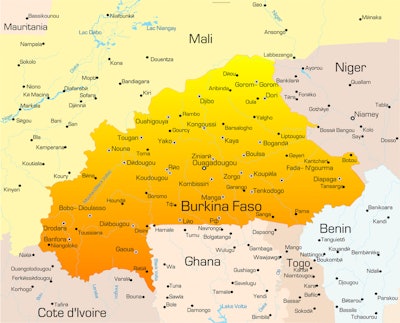
More than two years after the last cases, an outbreak of highly pathogenic avian influenza (HPAI) has been confirmed in Burkina Faso.
At the beginning of March, presence of the H5N1 virus serotype was detected after more than 400 birds out of a flock of 641 died. According to the official notification to the World Organisation for Animal Health (WOAH), the farm was located in the Central region, in the capital city Ouagadougou.
The source of the infection is unknown.
Affected by the latest outbreak was a turkey flock, reported VOA Afrique.
Officials said that measures were taken to control the outbreak, including stamping-out and surveillance within 1km of the infected farm.
Burkina Faso’s most recent previous outbreak registered with WOAH occurred at an egg farm. It started in December of 2021, and affected a premises with 150,000 hens, also in the Central region.
At the end of 2023, that earlier outbreak series was officially declared “resolved” to WOAH, without any further reported cases.
Outbreaks confirmed in 2 Nigerian states
In the last week of February, the national veterinary authority recorded two further HPAI outbreaks in poultry to WOAH.
Both occurred in the central state of Plateau, according to the notification. Testing positive for the H5N1 virus serotype were birds in one flock of 2,500 poultry, and another that comprised just two birds, both of which died.
Since the country’s first cases in this HPAI series involving commercial poultry in December of 2020, 456 outbreaks have been registered with WOAH. Directly impacted have been more than 2.4 million birds in 31 of Nigeria’s 37 states.
The same virus serotype has recently been detected in Kebbi in the northwest, according to the latest update on the disease situation in sub-Saharan Africa from the United Nations’ Food and Agriculture Organization (FAO; as of March 14).
By the end of February, FAO had recorded the first three HPAI outbreaks in Nigeria since October of last year. These were identified as occurring in Kebbi and Plateau, and involving unspecified numbers of geese and peacocks.
Last week, Daily Trust reported that several local farmers had cast doubt on whether the disease situation was under control, as the state and federal governments has asserted.
One state veterinary official confirmed that there was an HPAI outbreak, and that action had been taken to prevent further spread of the virus. He said that HPAI continues to spread between backyard poultry flocks because many owners do not take care with biosecurity.
In a letter to its members, the state chapter of the Poultry Association of Nigeria has urged farmers to act responsibly to protect their birds by setting up and maintaining hygiene standards.
Following the announcement of the outbreak in Kebbi, Daily Post authorities in the western state of Kwara urged owners to reports any signs of disease in their poultry to the authorities, and to follow established guidelines to prevent further spread of the virus in people or birds.
HPAI developments elsewhere in the region
Over the past month, South Africa’s animal health agency has updated WOAH on the HPAI situation in the country.
No further outbreaks have occurred on commercial farms, according to these notifications.
However, the number of birds impacted has been updated.
Since the current outbreak series linked to HPAI virus of the H5 family began in April of 2023, a total of almost 1.8 million birds have been hit by the disease at 28 locations.
At the end of May last year, the H7N6 virus serotype was detected in South Africa for the first time. So far, more than 11.1 million poultry and other birds on 113 commercial premises have been directly impacted by outbreaks linked to this virus variant.
Last month, HPAI virus was reported for the first time in Antarctica. Cases were confirmed in two wild seabirds found dead near a research station on the Antarctic mainland in January.
Since October, WOAH has been notified of 22 wild birds that have tested positive for the H5N1 virus variant in South Georgia and the South Sandwich Islands in the southern Atlantic Ocean.
Recently, presence of the same virus has been confirmed in two colonies of different penguin species in South Georgia, according to the government of this British Overseas Territory.
Concern has been expressed for the future health of Antarctic penguins, particularly as they have not previously been exposed to HPAI viruses.
View our continuing coverage of the global avian influenza situation.

















